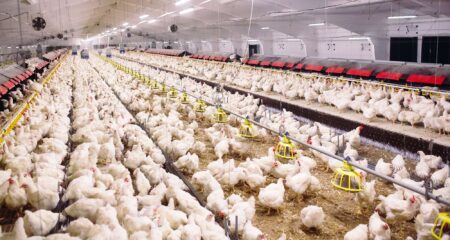A Washington, D.C., federal court has dismissed a suit filed by Texas farmers, environmentalists, and organic farm advocates to compel the Environmental Protection Agency to regulate per- and polyfluoroalkyl compounds found in sewage sludge fertilizer.
The case, James Farmer et al. v. United States Environmental Protection Agency, was filed by five farmers and ranchers from Grandview, Texas, and also Johnson County, Potomac Riverkeeper, Inc., and the Maine Organic Farmers and Gardeners Association.
The plaintiffs in the litigation asserted in the complaint that the EPA failed to fulfill its statutory duty under the Administrative Procedure Act and the Clean Water Act to identify and regulate PFAS compounds applied on agricultural land in biosolids. The plaintiffs also claimed that biennial sewage sludge rules reviews required under the Clean Water Act must include and regulate PFAS chemicals proven to be present in wastewater treatment residues.
“We never even knew what PFAS was until spring of ’23,” plaintiff Tony Coleman said. “It’s a very complicated subject just trying to wrap your head around what PFAS and PFOS are.”
PFAS make up a group of thousands of synthetic chemicals that are especially resistant to heat and water, leading them to be typically dubbed as “forever chemicals.” PFAS and associated chemicals — including PFOS and PFOA — accumulate over time in land, water, plants, fish, animals and people. The EPA has classified them as likely carcinogenic, and they are known to concentrate in organs such as the liver, kidneys and gall bladder.
Over the past seven years, high contamination levels have shut down a dairy farm in New Mexico, at least one beef operation in Michigan and multiple farms across Maine — the only state so far to outright ban the use of biosolids as fertilizer. Michigan requires testing biosolids now before they can be applied to the land.
The EPA’s most recent Biennial Report on Sewage Sludge, published in December 2022, listed eleven PFAS compounds as present in sludge samples but did not establish limits or management standards for them. The plaintiffs asked the court to compel the EPA to identify additional PFAS and to issue binding rules for their regulation.
Based on 2022 data from larger facilities nationally, the EPA estimates there are about 1.2 million tons of biosolids applied on farm ground nationally, and an additional 906,000 tons are used for home gardens, landscaping, golf courses, and other uses.

In a September 29, 2025, order, U.S. District Judge Dabney Friedrich granted the EPA’s motion to dismiss, providing a ruling that while the Clean Water Act requires the agency to review sewage sludge regulations every two years, it does not impose a firm deadline for identifying or regulating new pollutants.
“Although the plain language of the CWA imposes a non-discretionary duty on EPA to review its regulations on a biennial basis, it does not mandate that EPA also identify and regulate sewage-sludge pollutants within the same time frame,” Friedrich wrote.
The court found that the EPA’s biennial report, which lists pollutants present in sludge, is informational in nature and “does not determine any rights or obligations nor create any legal consequences.” Because the report is not a “final agency action,” it cannot be challenged under the Administrative Procedure Act.
The judge also noted that affected parties still have the option to petition EPA to initiate rulemaking to regulate PFAS under existing administrative procedures. “EPA’s denial of any such petition could constitute a final agency action subject to APA review,” the opinion stated.


:max_bytes(150000):strip_icc()/Markets-10-Corn-up-wheat-up-5-a41d988ceef74aedbcbc093b791d7bdc.jpeg)
:max_bytes(150000):strip_icc()/IMG_1591-2048x1365-362687ca596f4814967abffff2b4be2c.jpg)
:max_bytes(150000):strip_icc()/SuccessfulFarmingShareImage-8fed6410b43147a19ed5ea1e3243227f.png)




:max_bytes(150000):strip_icc()/IMG_7575-ac6db3006a2145109bcc2df421c7a962.jpeg)
